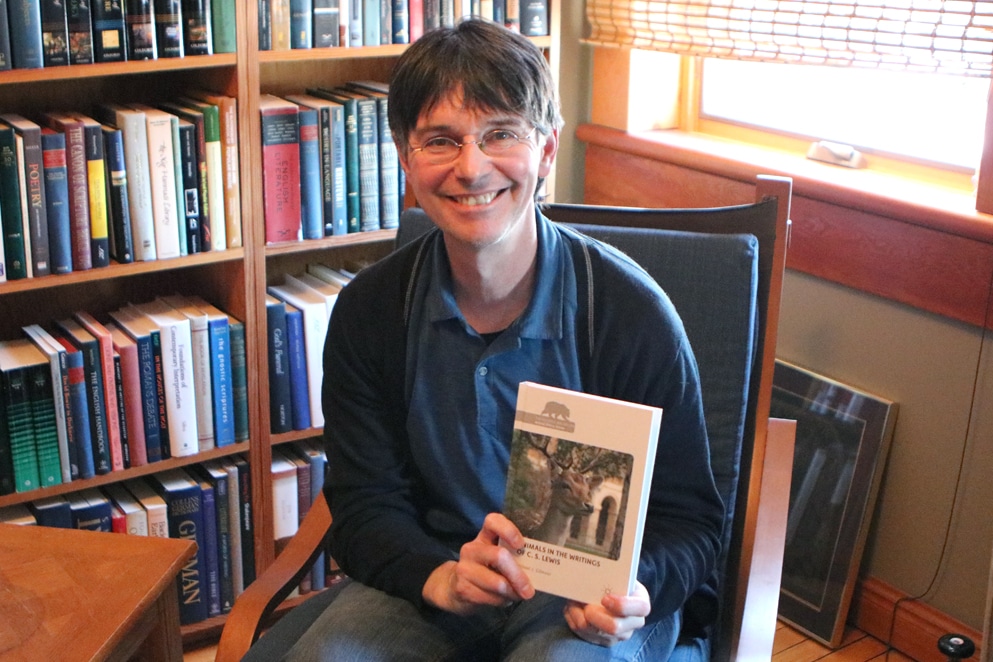C. S. Lewis is best known as the author, scholar and theologian who produced such masterworks as Mere Christianity, The Screwtape Letters, The Space Trilogy and The Chronicles of Narnia. According to Dr. Michael Gilmour, Professor of New Testament and English Literature at Providence, Lewis can also be accessed and interpreted through the lens of animal ethics.
In his latest book, Animals in the Writings of C. S. Lewis, Dr. Gilmour follows up his previous work, Eden’s Other Residents: The Bible and Animals, with an application of that lens to Genesis.
“We might think we go to Genesis for the human story, but it seems to me that Lewis, to a large extent, offers a dramatic alternative,” he says. “In the recreations of Eden we find in The Space Trilogy, for instance, we’re dealing with non-human characters, and in that case the humans are the serpents in the garden. Even in Narnia it’s the same idea—that the animals, in a sense, are the Adam and Eves of the story, and it’s humanity that brings evil into this new creation and spoils it.”
Dr. Gilmour cites Lewis’s use of the talking lion Aslan, who remarks that although humans brought evil into the world they will be integral to its restoration.
“That strikes me as profoundly biblical,” he says. “In Romans 8 we read that creation is ‘groaning’ and that the groaning will not cease until the children of God come into fullness. It seems like Lewis has kind of enacted that. He’s given us a vision of a good creation spoiled by humans, but humans having a role in bringing it back to where it ought to be.”
Writing in his book that “all life matters because God is the author of all life,” and that “writers who remind us of this are often prophets in their hometown, ignored as often as not,” Dr. Gilmour expresses impatience with a Christian church that, he says, looks upon questions of animal ethics with “complete indifference.” He is also concerned that terms such as “dominion,” as in having dominion over creation, have been used to promote a sort of creational “despotism.”
“Think of the setting of that term,” he explains. “It shows up when God has brought the world into existence, declared it good and then shared His image with humanity. Another way of thinking of it is if you think of the image of priesthood in the Old Testament. It’s not war-mongering. It’s leadership that brings peace and harmony and unity. It seems to me that there are other ways of thinking about dominion than just ownership, possession and exploitation. The Bible has much more to say about positive responsibility towards creation than it does about raping the land.”
But, says Dr. Gilmour, Lewis also looks forward with hope to when the world will be made right. “The lion will lie with the lamb; the child will put its hand over the serpent’s den. There will be peace in nature. That’s an eschatological hope.”
Animals in the Writings of C. S. Lewis also challenges readers to make a difference in the world, that there are things to be done here and now that can help repair the relationship between humans and the rest of creation, that can help ease the groaning. For Lewis, it was vehement opposition to vivisection—experimentation on live animals.
“This was a controversial stance in the university environment of the mid-20th century,” says Dr. Gilmour. “Some people speculate he even lost promotions as a result. He was certainly ridiculed for his views.”
Lewis’s marriage of religious hope and activism is one Dr. Gilmour suggests Christians should replicate.
“That’s where I think Christians ought to step in,” he says. “There are things we can do to make this world a better place while we wait for the ultimate arrival of the Kingdom of Peace.”
VIDEO: Watch Dr. Michael Gilmour discuss a Christian response to animal suffering


